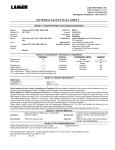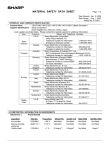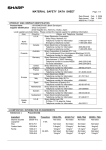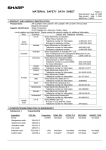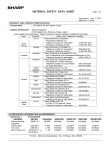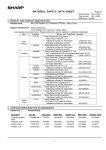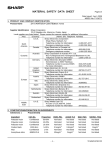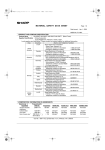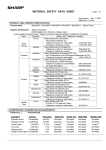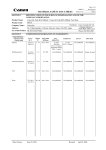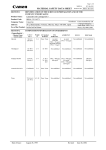Download Toshiba ZT170F (T170F)
Transcript
MATERIAL SAFETY DATA SHEET Date of Preparation Date of Revised SECTION 1 : 20 January , 2005 : MSDS : T170FKUJ1W Page 1 of 6 CHEMICAL PRODUCT AND COMPANY IDENTIFICATION Product Name Used for Company Name Address Telephone Number : : : : : Contact : (1) Toshiba America Information Systems, Inc. Emergency Telephone. No. : +1-800-424-9300 For calls within the U.S. only. (2) Toshiba of Canada Limited Telephone. No. : +1-905-405-3500 For calls within Canada only. (3) Toshiba TEC Germany Imaging Systems GmbH Telephone. No. : +49-2131-1245-0 (European Headquarter) (4) Toshiba (Australia) Pty, Ltd. Telephone. No. : +61-2-98873322 SECTION 2 +81-3-6422-7753 COMPOSITION/INFORMATION ON INGREDIENTS INGREDIENT(S) Polyester resin Carbon black Polyolefin wax Organic pigment Amorphous silica SECTION 3 T-170F Toshiba Copiers, e-STUDIO 170F Toshiba TEC Corporation 2-17-2, Higashigotanda, Shinagawa-ku, Tokyo, 141-8664, Japan CAS No. wt.% ------>90 1333-86-4 1-10 ------1-10 ------1-10 109125-51-1 <1 ------Trade Secret HAZARDS IDENTIFICATION Most Important Hazards and Effects of the Products Human Health Effects : There are no anticipated carcinogenic effects from exposure based on animal tests performed using toner. When used as intended according to instructions, studies do not indicate any symptoms of fibrosis will occur. Environmental Effects : No data are available. Specific hazards : Dust explosion (like most finely divided organic powders) MATERIAL SAFETY DATA SHEET Product Identity : T-170F MSDS : T170FKUJ1W Page 2 of 6 SECTION 4 FIRST AID MEASURES Route(s) of Entry Inhalation? Skin? Ingestion ? Inhalation Skin Contact Eye Contact Ingestion Yes No Possible but very unusual. Remove to fresh air . If symptoms occur, consult medical personnel. Wash with soap and water for 15 minutes or until particle is removed. It irritation does occur, consult medical personnel. : Flush eyes immediately with water for 15 minutes. If irritation does occur, consult medical personnel. : Rinse with water and drink several glasses of water . If irritation or discomfort does occur, consult medical personnel. : : : : : SECTION 5 FIRE FIGHTING MEASURES Extinguishing Media : Water , CO 2, foam and dry chemicals Special Fire fighting Procedur : None Fire & Explosion Hazards : Toner material, like most finely divided organic powders, may form an explosive mixture. SECTION 6 ACCIDENTAL RELEASE MEASURES Personal Precautions Environmental Precautions Methods for Cleaning Up SECTION 7 : None : None : Wipe off with paper or cloth. Do not use vacuum cleaner when a large amount is released. It, like most finely divided organic powders, is capable of creating a dust explosion. HANDLING AND STORAGE Handling Technical Measures Precautions Safe Handling Advice Storage Technical h4easupes Storage Conditions Incompatible Products : None : None : Use of a dust mask is recommended when handling a large quantity of toner or during long term exposure, as with any non-toxic dust. Try not to disperse the particles. : None : Keep container closed and store in a cool and dry place. Keep out of the reach of children. : None MATERIAL SAFETY DATA SHEET Product Identity : T-170F MSDS : T170FKUJ1W Page 3 of 6 SECTION 8 EXPOSURE CONTROLS/PERSONAL PROTECTION Engineering Measures Ventilation Exposure Limits OSHA PELs (TWA) as the product Carbon black Metal Complex dye Other substances ACGIH TLVs (TWA) as the product Carbon black Metal Complex dye Other substances DFG-MAK (TWA) as the product None required with intended use. : 15mg/m 3 (Total dust) 5mg/m 3 (Respirable fraction) : 3.5 mg/m 3 3 : 0.5 mg/m : Not listed : 10mg/m 3 (Total dust) 3mg/m 3 (Respirable fraction) : 3.5 mg/m 3 3 : 0.5 mg/m : Not listed : 4mg/m 3 (Inhalable fraction) 1.5mg/m 3 (Respirable fraction) : Not listed All substances NOHSC (TWA) : All substances Personal Protective Equipment : Respiratory Protection : Hand Protection : Eye Protection : Skin Protection Other Protective Equipmen : SECTION 9 Not listed Not required under intended use. Not required under intended use. Not required under intended use. Not required under intended use. Not required under intended use. PHYSICAL AND CHEMICAL PROPERTIES Appearance Physical State Form Color Scent Melting Point Softening point Flash Point Specific Gravity(H2O=1) Explosion Properties : Solubility in Water pH Value : : : : : : : : : : : Solid Powder Black Odorless Not applicable 120 - 130 degree Not applicable 1.2 No data Negligible Not a water-based product, therefore not applicable. MATERIAL SAFETY DATA SHEET Product Identity : T-170F MSDS : T170FKUJ1W Page 4 of 6 SECTION 10 STABILITY AND REACTIVITY Stability : Stable : Dust explosion, like most finely divided organic powders. Hazardous Reactions : Electric discharge, throwing into fire. Conditions to avoid : Oxidizing Materials Materials to avoid Hazardous Decomposition Products : CO,CO2 and NOx Further Information SECTION 11 SUPPLEMENTAL HEALTH INFORMATION Acute oral toxicity Acute inhalation Eye irritation Skin irritation Skin sensitization Mutagenicity Carcinogenicity : Chronic Effects : SECTION 12 : None : LD50 is greater than5,000mg/kg. (This was the highest attainable mass.) : LC50(4H) is in excess of 0.74mg/l. (This was the highest attainable concentration.) : Non-irritant. : Non-irritant. : No Data : Negative in the Ames test. : In 1996, the IARC classified carbon black as a Group 2B carcinogen (possible human carcinogen). : In a study in rats by chronic inhalation exposure to a typical toner, a mild to moderate degree of lung fibrosis was observed in 92 % of the rats in the high concentration (16 mg/m3)exposure group, and a minimal to mild degree of fibrosis was noted in 22% of the animals in the middle (4 mg/m 3) exposure group. These findings are attributed to "lung overloading", a general response to excessive amounts of any dust retained in the lings for a prolonged period. ECOLOGICAL INFORMATION No data available. SECTION 13 DISPOSAL CONSIDERATION Waste from residues Contaminated Packaging SECTION 14 : Waste material may be dumped or incinerated under conditions which meet all federal, state and local environmental regulations. : Waste may be disposed or incinerated under conditions which meet all federal, state and local environmental regulations. TRANSPORTATION INFORMATION UN Classification Number Land DOT(USA) Sea IMDG Air ICAO-TI : : : : None None None None MATERIAL SAFETY DATA SHEET Product Identity : T-170F MSDS : T170FKUJ1W Page 5 of 6 SECTION 15 REGULATORY INFORMATION US Information Toxic Substance Control Act (TSCA) : All chemical substances in this product comply with all applicable rules or orders under TSCA. SARA(Superfund Amendments and Reauthorization Act) Title lll 302 Extreme Hazardous Substance : None 311/312 Hazard Classification : None EU Information 67/548/EEC & 1999/45/EC : Not required Symbol & Indication : Not required Risk Phrase : Not required Safety Advise Phrase : All chemical substances in this product comply with all 76/769/EEC applicable rules or order under 76/769/EEC. SECTION 16 OTHER INFORMATION National Fire Protection Association (NFPA) Classification : 1 Flammability : 0 Reactivity : 1 Health ( 0 = insignificant, 1 = slight ) WHMIS Legislation (Canada) : This product is not a controlled product. MATERIAL SAFETY DATA SHEET Product Identity : T-170F MSDS : T170FKUJ1W Page 6 of 6 Notice : Judgments as to the suitability of information herein for purchaser's purposes are necessarily purchaser's responsibility. Therefore, although reasonable care has been taken in the preparation of such information, Toshiba Corporation extends no warranties, makes no representations, and assumes no responsibility as to the accuracy or suitability of such information for application to purchaser's intended purposes or for consequences of its use. References : IARC (1996) IARC Monographs on the Evaluation of the Carcinogenic Risks of Chemicals to Humans, Vol. 65, Printing Processes and Printing Inks, Carbon Black and Some Nitro Compounds, Lyon, pp. 149-261. H. Muhle, B. Bellmann, O. Creutzenberg, C. Dasenbrock, H. Ernst, R. Kilpper, J. C. MacKenzie, P. Morrow, U. Mohr, S. Takenaka, and R. Mermelstein (1991). Pulmonary Response to Toner upon Chronic Inhalation Exposure in Rats, Fundamental and Applied Toxicology 17, pp. 280-299. Abbreviation : (1) OSHA PEL stands for Permissible Exposure Limit under Occupational Safety and Health Administration (USA). (2) ACGIH TLV stands for Threshold Limit Value under American Conference of Governmental Industrial Hygienists (USA). (3) DFG-MAK stands for Maximale Arbeitsplatzkonzentrationen under Deutsche Forschungsgemeinschaft. (4) TWA stands for Time Weighted Average. (5) IARC stands for International Agency for Research on Cancer. (6) NTP stands for National Toxicology Program (USA). (7) NIOSH stands for National Institute for Occupational Safety and Health (USA). (8) DOT stands for Department of Transportation (USA). (9) NOHSC stands for National Occupational Heath and Safety Commission (Australia). Prepared by : Toshiba TEC Corporation Quality Assurance Department 6-78 Minami-cho, Mishima-shi, Shizuoka-ken, 411-8520 Japan






